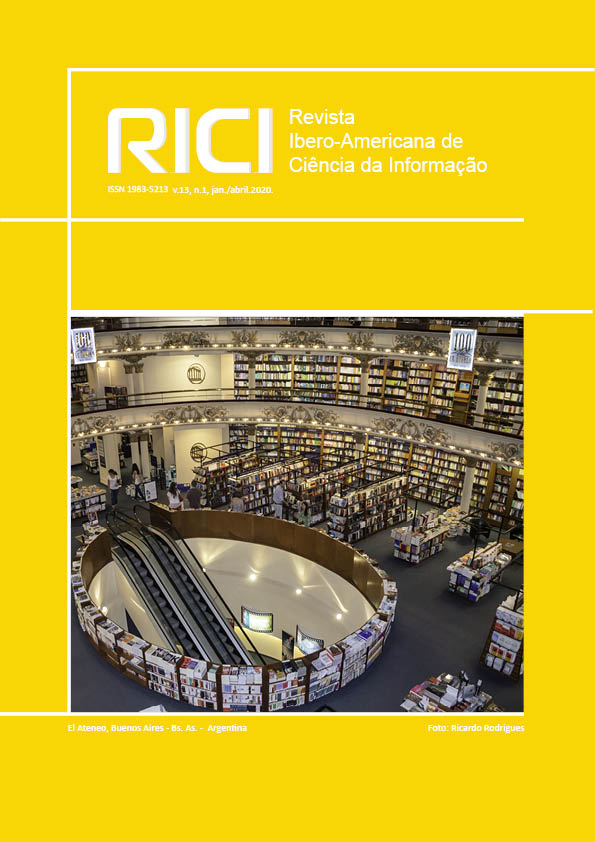Vocabulário controlado e indexação social de imagens de arquitetura: um sistema de organização do conhecimento em ambiente colaborativo
DOI:
https://doi.org/10.26512/rici.v13.n1.2020.29566Palavras-chave:
ambiente colaborativo. imagens de arquitetura. indexação social. vocabulário controlado. sistemas de organização do conhecimento.Resumo
Este trabalho tem por objetivo relatar a pesquisa realizada para o desenvolvimento de um vocabulário controlado em ambiente colaborativo web, o qual permite a indexação social pelo tagueamento das imagens postadas tanto pelo usuário pessoal quanto pelo usuário institucional. Criado para preservação e divulgação de imagens de arquitetura brasileira, o Arquigrafia é também uma rede social formada por estudantes, professores, pesquisadores, profssionais e interessados em fotografias de Arquitetura e Espaços Urbanos. Assim, foi necessária a análise da lista de tags para melhoria da consistência da indexação, buscando-se uma organização conceitual dos termos do domínio a partir da aplicação de metodologia terminológica, visando ainda o alinhamento dos termos do vocabulário em construção com outros sistemas de organização do conhecimento.
Downloads
Referências
ANGUS, E.; STUART, D.; THELWALL, M. Flickr's potential as an academic image resource: an exploratory study. Journal of Librarianship and Information Science, v. 42, n. 4, p. 268-278, 2010.
BRADLEY, P. From Flickr to Playbills -- How to Find the Right Images. CILIP UPDATE with gazette, United Kingdom, p. 23-23, Jul., 2011.
FONT, F.; SERRA, J.; SERRA, X. Folksonomy-based tag recommendation for collaborative tagging systems. International Journal on Semantic Web and Information Systems, v. 9, n. 2, p. 1-30, 2013.
HODGE, G. Systems of knowledge organization for digital libraries: beyond traditional authority files. Washington, DC: Digital Library Federation, 2000.
HUGHES, A. V.; RAFFERTY, P. Inter-indexer consistency in graphic materials indexing at the National Library of Wales. Journal of Documentation, v. 67, n. 1, p. 9-32, 2011.
LIMA, V. M. A.; ROZESTRATEN, A.S.; SANTOS, C. A. C. M; MARQUES, E. A; SAMPAIO, L. A. Arquigrafia: um repositório digital de imagens em ambiente colaborativo web. RBBD Revista Brasileira de Biblioteconomia e Documentação, v. 12, p. 103-107, 2016.
LIMA, V. M. A.; COSTA, I. G.; GUIMARÃES, M. O. A Organização do Conhecimento no domínio das Artes: o fazer terminológico na gestão do vocabulário controlado. In: Memória, tecnologia e cultura na organização do conhecimento. Recife: Editora UFPE, 2017.
MOREIRO GONZÁLEZ, J. A. Linguagens documentárias e vocabulários semânticos para a web: elementos conceituais. Salvador: EDUFBA, 2011. 128 p.
NATIONAL INFORMATION STANDARDS ORGANIZATION. Guidelines for the construction, format, and management of monolingual controlled vocabularies. Baltimore: NISO, 2010. 172 p. (ANSI/NISO Z39.19-2005 R2010).
RAFFERTY, P. “Tagging”. Knowledge Organization, v. 45, n. 6, p. 500-516, 2018.
ROZESTRATEN, A. S.; ANDRADE, B. M.; FIGUEIREDO, F. G. Manual de procedimentos técnicos do projeto arquigrafia. São Paulo: FAUUSP, 2018. 56p.
ROZESTRATEN, A. S.; LIMA, V. M. A.; SANTOS, C. A. C. M. ARQUIGRAFIA: digital images in the collaborative environment on the Web. In: IFLA Satellite Meeting 2017: Digital Humanities, 2017, Berlin. Digital Humanities. Haia: IFLA, 2017.
ROZESTRATEN, A. S.; PEREIRA, D. A. O. Arquigrafia entre 2009 e 2014. FAUUSP, 2014.
SANTOS, L.; SANTOS, C. A. C. M. Arquigrafia: um projeto de indexação de fotografias no meio digital. In: SIMPÓSIO INTERNACIONAL DE INICIAÇÃO CIENTÃFICA E TECNOLÓGICA DA USP, 2017, 25., São Paulo. Anais... Publicações SIICUSP. São Paulo: Universidade de São Paulo, 2017. v. 25.
Downloads
Publicado
Como Citar
Edição
Seção
Licença
Notas de direitos autorais
Autores que publicam nesta revista concordam com os seguintes termos: Autores mantém os direitos autorais e concedem à revista o direito de primeira publicação, com o trabalho simultaneamente licenciado sob a Creative Commons Attribution License 4.0, permitindo o compartilhamento do trabalho com reconhecimento da autoria do trabalho e publicação inicial nesta revista. Autores têm autorização para assumir contratos adicionais separadamente, para distribuição não-exclusiva da versão do trabalho publicada nesta revista (ex.: distribuir em repositório institucional ou publicar como capítulo de livro), com reconhecimento de autoria e publicação inicial nesta revista. Autores têm permissão e são estimulados a distribuir seu trabalho online (ex.: em repositórios institucionais ou na sua página pessoal) a qualquer ponto antes ou durante o processo editorial, já que isso pode gerar alterações produtivas, bem como aumentar o impacto e a citação do trabalho publicado.
















